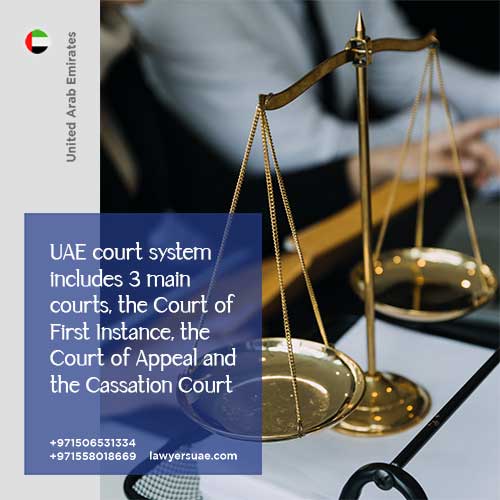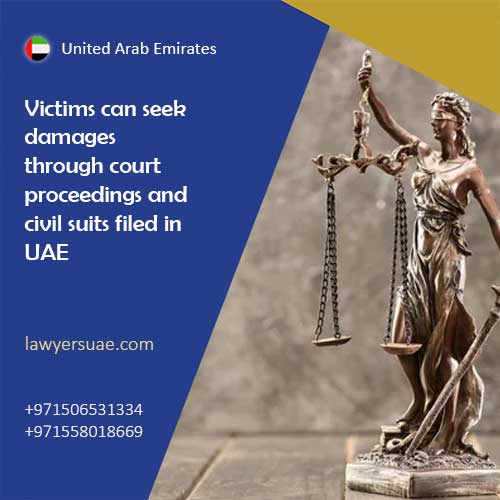The United Arab Emirates has established a comprehensive penal code that serves as the foundation for its criminal law. This legal framework plays a crucial role in maintaining law and order within the country while reflecting the cultural values and traditions of the UAE society. An understanding of the UAE’s penal code is essential for residents, visitors, and businesses operating in the nation to ensure compliance and avoid legal consequences. This article aims to provide a comprehensive guide to the criminal law of the UAE, exploring the key aspects and provisions outlined in the penal code.
What is The Main Criminal Law Governing The UAE?
The UAE Penal Code, officially known as the Federal Law No. 3 of 1987 on Issuance of the Penal Code, recently updated in 2022 with Federal Law No. 31 of 2021, is based on a combination of Sharia (Islamic law) principles and contemporary legal practices. In addition to Islamic principles, the criminal process in Dubai draws regulation from the Criminal Procedures Law No 35 of 1991. This law directs the filing of criminal complaints, criminal investigations, trial processes, judgments, and appeals.
Những người chủ yếu tham gia vào quá trình hình sự ở UAE là nạn nhân / người khiếu nại, người bị buộc tội / bị cáo, cảnh sát, Công tố viên và tòa án. Các phiên tòa hình sự thường bắt đầu khi nạn nhân nộp đơn tố cáo một người bị buộc tội tại đồn cảnh sát địa phương. Cảnh sát có nhiệm vụ điều tra những hành vi phạm tội bị cáo buộc, trong khi Công tố viên buộc tội người bị buộc tội ra tòa.
Hệ thống tòa án của UAE bao gồm ba tòa án chính:
- Tòa sơ thẩm: Khi mới được nộp đơn, tất cả các vụ án hình sự đều được đưa ra trước tòa án này. Tòa án bao gồm một thẩm phán duy nhất xét xử vụ án và đưa ra phán quyết. Tuy nhiên, ba thẩm phán xét xử và xác định vụ việc trong một phiên tòa trọng tội (áp dụng các hình phạt khắc nghiệt). Không có phụ cấp cho một phiên tòa xét xử bồi thẩm đoàn ở giai đoạn này.
- Tòa phúc thẩm: Sau khi Tòa án cấp sơ thẩm tuyên án, một trong hai bên có thể nộp đơn kháng cáo lên Tòa án cấp phúc thẩm. Xin lưu ý rằng tòa án này không xét xử lại vấn đề. Nó chỉ phải xác định xem có sai sót trong phán quyết của tòa án cấp dưới hay không.
- Tòa giám đốc thẩm: Bất kỳ người nào không hài lòng với phán quyết của Tòa án cấp phúc thẩm có thể tiếp tục kháng cáo lên Tòa án cấp giám đốc thẩm. Quyết định của tòa án này là quyết định cuối cùng.
Nếu bị kết án về một tội ác, sự hiểu biết Quy trình kháng cáo hình sự ở UAE là điều cần thiết. Một luật sư kháng cáo hình sự có kinh nghiệm có thể giúp xác định các căn cứ để kháng cáo bản án hoặc bản án.
What are the key principles and provisions of the UAE’s Penal Code?
The UAE Penal Code (Federal Law No. 3 of 1987) is based on a combination of Sharia (Islamic law) principles and contemporary legal concepts. It aims to maintain law and order while preserving the cultural and religious values of the UAE society, as per the general principles outlined in Article 1.
- Principles Derived from Sharia Law
- Prohibitions on activities like gambling, alcohol consumption, illicit sexual relations
- Hudud crimes like theft and adultery have Sharia-prescribed punishments e.g. amputation, stoning
- Retributive “eye for an eye” justice for crimes like murder and bodily harm
- Contemporary Legal Principles
- Codification and standardization of laws across emirates
- Clearly defined crimes, penalties, statutory limitations
- Due process, presumption of innocence, right to counsel
- Các điều khoản chính
- Crimes against state security – treason, terrorism, etc.
- Crimes against individuals – murder, assault, defamation, honor crimes
- Financial crimes – fraud, breach of trust, counterfeiting, money laundering
- Cybercrimes – hacking, online fraud, illegal content
- Public safety, moral crimes, prohibited activities
The Penal Code blends Sharia and contemporary principles, though some provisions face human rights criticism. Consulting local legal experts is recommended.
Criminal Law vs Criminal Procedure Law in the UAE
Criminal Law defines the substantive rules that establish what constitutes a crime and prescribe the punishment or penalty to be imposed for proven offenses. It is covered under the UAE Penal Code (Federal Law No. 3 of 1987).
Những khía cạnh quan trọng:
- Categories and classifications of crimes
- Elements that must be proven for an act to qualify as a crime
- The punishment or sentence corresponding to each crime
For example, the Penal Code defines murder as a criminal offense and specifies the punishment for someone convicted of murder.
Criminal Procedure Law, on the other hand, establishes the procedural rules and processes for enforcing the substantive criminal laws. It is outlined in the UAE Criminal Procedure Law (Federal Law No. 35 of 1992).
Những khía cạnh quan trọng:
- Powers and limitations of law enforcement in investigations
- Procedures for arrest, detention, and charging an accused
- Rights and protections afforded to the accused
- Conducting trials and court proceedings
- The appeals process after a judgment
For instance, it lays down rules for collecting evidence, the process of charging someone, conducting a fair trial, and the appeals mechanism.
While criminal law defines what a crime is, criminal procedure law ensures those substantive laws are implemented properly through an established judicial process, from investigation to prosecution and trials.
The former outlines legal consequences, the latter enables enforcement of those laws.
Phân loại vi phạm và tội phạm trong luật hình sự UAE
Trước khi gửi đơn khiếu nại hình sự, điều cần thiết là phải tìm hiểu các loại tội phạm và tội phạm theo luật của UAE. Có ba loại tội phạm chính và hình phạt của chúng:
- Tương phản (Vi phạm): Đây là loại tội nhẹ nhất hoặc tội nhẹ nhất trong các tội của UAE. Chúng bao gồm bất kỳ hành động hoặc thiếu sót nào có thể dẫn đến hình phạt hoặc hình phạt không quá 10 ngày tù giam hoặc phạt tiền tối đa 1,000 dirhams.
- Sai lầm: A misdemeanor is punishable with confinement, a fine of 1,000 to 10,000 dirhams at most, or deportation. The offence or penalty may also attract Tự làm, một khoản thanh toán "tiền máu" của người Hồi giáo.
- trọng tội: Đây là những tội ác khắc nghiệt nhất theo luật của Các Tiểu Vương quốc Ả Rập Thống nhất và chúng có thể bị trừng phạt tối đa là tù chung thân, tử hình hoặc Tự làm.
How Are Criminal Laws Enforced in The UAE?
Criminal laws in the UAE are enforced through the combined efforts of law enforcement agencies, the public prosecution, and the judicial system, as outlined in the UAE Criminal Procedure Law. The process typically begins with an investigation conducted by police authorities upon receiving information about a potential crime. They have the power to summon individuals, collect evidence, make arrests, and refer cases to the public prosecution.
The public prosecution then reviews the evidence and decides whether to press formal charges or dismiss the case. If charges are filed, the case proceeds to trial in the relevant court – the Court of First Instance for felonies and misdemeanors, and the Court of Misdemeanors for lesser offenses. Trials are overseen by judges who evaluate the evidence and testimonies presented by the prosecution and defense.
After the court issues a judgment, both the convicted person and the prosecution reserve the right to appeal to higher courts like the Court of Appeal and then the Court of Cassation. The enforcement of final verdicts and sentences is carried out through the police, public prosecution, and the prison system in the UAE.
What is The Process For Reporting A Crime in The UAE?
When a crime occurs in the UAE, the first step is to file a complaint with the police at the nearest station, preferably close to where the incident took place. This can be done either orally or in writing, but the complaint must clearly detail the events that constitute the alleged criminal offense.
The police will have the complainant provide their statement, which is recorded in Arabic and must be signed. Additionally, UAE law allows complainants to call witnesses who can corroborate their account and lend credibility to the allegations. Having witnesses provide supplementary context can greatly aid the subsequent criminal investigation.
Once a complaint is filed, the relevant authorities commence an investigation to verify the claims and attempt to identify and locate potential suspects. Depending on the nature of the crime, this could involve legal officers from the police, immigration officials, coast guards, municipality inspectors, border patrol, and other law enforcement agencies.
A key part of the investigation is interrogating any identified suspects and taking their statements. The suspects also have the right to present their own witnesses to support their version of events. Authorities collect and analyze all available evidence such as documents, photos/videos, forensics, and witness testimony.
If the investigation finds sufficient evidence of a criminal act, the public prosecutor then decides whether to press formal charges. If charges are filed, the case proceeds to the UAE courts as per the Criminal Procedure Law.
At this stage, those looking to pursue a criminal case against another party should take certain steps in addition to the police complaint:
- Obtain a medical report documenting any injuries
- Gather other evidence like insurance records and witness statements
- Consult an experienced criminal defense lawyer
If the prosecutor moves forward with charges, the complainant may need to file a civil lawsuit to have the criminal case heard in court.
Những Loại Tội Phạm Có Thể Bị Báo Cáo?
Các tội danh sau đây có thể được trình báo cho cảnh sát ở UAE:
- Giết người
- Giết người
- Hiếp dâm
- Tấn công tình dục
- Ăn trộm
- Trộm
- Tham ô
- Các trường hợp liên quan đến giao thông
- Giả mạo
- Làm giả
- Vi phạm Ma túy
- Bất kỳ tội phạm hoặc hoạt động nào khác vi phạm pháp luật
Đối với các sự cố liên quan đến an toàn hoặc quấy rối, cảnh sát có thể được liên hệ trực tiếp thông qua Dịch vụ Aman của họ theo số 8002626 hoặc qua SMS tới 8002828. Ngoài ra, các cá nhân có thể báo cáo tội phạm trực tuyến thông qua Trang web của cảnh sát Abu Dhabi hoặc tại bất kỳ chi nhánh nào của Cục Điều tra Hình sự (CID) ở Dubai.
What Are The Procedures For Criminal Investigations And Trials in The UAE?
Criminal investigations in the UAE are governed by the Criminal Procedure Law and overseen by the public prosecution. When a crime is reported, the police and other law enforcement agencies conduct an initial investigation to gather evidence. This can involve:
- Questioning suspects, victims, and witnesses
- Collecting physical evidence, documents, recordings etc.
- Conducting searches, seizures, and forensic analysis
- Working with experts and consultants as needed
The findings are presented to the public prosecution, who reviews the evidence and decides whether to press charges or dismiss the case. The Public Prosecutor will invite and separately interview the complainant and suspect to ascertain their stories. At this stage, either party may produce witnesses to verify their account and help the Public Prosecutor determine if a charge is necessary. Statements at this stage are also made or translated into Arabic and signed by both parties. If charges are filed, the prosecution prepares the case for trial.
Criminal trials in the UAE take place in the courts under the purview of judges. The process typically involves:
- The charges being read out by the prosecution
- The defendant entering a plea of guilty or not guilty
- The prosecution and defense presenting their evidence and arguments
- Examination of witnesses from both sides
- Closing statements from prosecution and defense
The judge(s) then deliberate in private and issue a reasoned judgment – acquitting the defendant if not convinced of guilt beyond reasonable doubt or issuing a conviction and sentence if they find the defendant guilty based on the evidence.
Both the convicted person and prosecution have the right to appeal to higher courts against the judgment or sentence. The appeals courts review the case records and may uphold or overturn the lower court’s decision.
Throughout the process, certain rights such as presumption of innocence, access to legal counsel, and standards of evidence and proof must be upheld as per UAE law. Criminal courts handle cases ranging from minor offenses to serious crimes like financial fraud, cybercrimes, and violence.
Có Thể Theo Dõi Vụ Án Hình Sự Nếu Không Thể Tìm Ra Kẻ Gây Án Không?
Có, có thể theo đuổi vụ án hình sự trong một số trường hợp, ngay cả khi không xác định được hung thủ. Giả sử nạn nhân đã thu thập bằng chứng ghi lại cách họ bị thương và có thể cung cấp tài liệu rõ ràng về thời gian và địa điểm vụ việc xảy ra. Trong trường hợp đó, nó sẽ có thể theo đuổi một vụ án hình sự.
What Are The Legal Rights Of Victims Under UAE’s Criminal Law?
The UAE takes measures to protect and uphold the rights of crime victims during the legal process. Key rights afforded to victims under the UAE Criminal Procedure Law and other regulations include:
- Right to File a Criminal Complaint Victims have the right to report crimes and initiate legal proceedings against perpetrators
- Rights During Investigation
- Right to have complaints promptly and thoroughly investigated
- Right to provide evidence and witness testimony
- Right to participate in certain investigative measures
- Rights During Trial
- Right to access legal counsel and representation
- Right to attend court hearings unless excluded for reasons
- Right to review/comment on evidence submitted
- Right to Seek Damages/Compensation
- Right to claim compensation from perpetrators for damages, injuries, medical expenses and other quantifiable losses
- Victims can also seek reimbursement for travel and other expenses but not for wages/income lost due to time spent attending court proceedings
- Rights Related to Privacy, Safety and Support
- Right to have identities protected and kept confidential if required
- Right to protection measures for victims of crimes like human trafficking, violence etc.
- Access to victim support services, shelters, counseling and financial aid funds
The UAE has established mechanisms for victims to claim damages and compensation through civil lawsuits against perpetrators. Additionally, victims have the right to legal assistance and can appoint lawyers or have legal aid assigned. Support entities also provide free advice and counsel.
Overall, UAE laws aim to safeguard victims’ rights to privacy, prevent re-victimization, ensure safety, enable compensation claims, and provide rehabilitation services during the criminal justice process.
Vai trò của Luật sư bào chữa trong các vụ án hình sự là gì?
Luật sư bào chữa có trách nhiệm bào chữa cho người phạm tội trước tòa. Họ có thể phản đối những bằng chứng do công tố viên đưa ra và lập luận rằng kẻ phạm tội nên được trả tự do hoặc được giảm án.
Dưới đây là một số nhiệm vụ của luật sư hình sự trong các vụ án hình sự:
- Luật sư bào chữa có thể thay mặt người vi phạm nói chuyện tại các phiên tòa.
- Nếu vụ án kết thúc bằng tuyên án, luật sư sẽ làm việc với bị cáo để xác định mức án thích hợp và đưa ra các tình tiết giảm nhẹ để giảm nhẹ bản án.
- Khi thương lượng về việc biện hộ với bên công tố, luật sư bào chữa có thể đưa ra đề nghị xin giảm án.
- Luật sư bào chữa có trách nhiệm đại diện cho bị cáo trong các phiên tòa tuyên án.
Vai trò của Bằng chứng Pháp y trong các vụ án hình sự là gì?
Bằng chứng pháp y thường được sử dụng trong các vụ án hình sự để xác lập các tình tiết của một vụ việc. Điều này có thể bao gồm bằng chứng DNA, dấu vân tay, bằng chứng đạn đạo và các loại bằng chứng khoa học khác.
Vai trò của Cảnh sát trong các vụ án hình sự là gì?
Khi có đơn tố cáo, cảnh sát sẽ chuyển nó đến các bộ phận liên quan (bộ phận pháp y, bộ phận tội phạm điện tử, v.v.) để xem xét.
Sau đó, cảnh sát sẽ chuyển đơn khiếu nại đến cơ quan công tố, nơi một công tố viên sẽ được chỉ định xem xét theo Bộ luật Hình sự UAE.
Cảnh sát cũng sẽ điều tra đơn kiện và thu thập bằng chứng để hỗ trợ vụ việc. Họ cũng có thể bắt và giam giữ người vi phạm.
Vai trò của Kiểm sát viên trong các vụ án hình sự là gì?
Khi một đơn khiếu nại được chuyển đến cơ quan công tố, một công tố viên sẽ được chỉ định để xem xét nó. Sau đó công tố viên sẽ quyết định có khởi tố vụ án hay không. Họ cũng có thể chọn hủy bỏ vụ việc nếu không có đủ bằng chứng để chứng minh.
Công tố viên cũng sẽ làm việc với cảnh sát để điều tra đơn kiện và thu thập bằng chứng. Họ cũng có thể bắt và giam giữ người vi phạm.
Vai trò của Luật sư của Nạn nhân trong các Vụ án Hình sự là gì?
Một người phạm tội có thể bị kết án và buộc phải bồi thường cho nạn nhân trong một số trường hợp. Luật sư của nạn nhân sẽ làm việc với tòa án trong khi tuyên án hoặc sau đó để thu thập bằng chứng nhằm xác định xem người phạm tội có đủ khả năng tài chính để bồi thường cho nạn nhân hay không.
Luật sư của nạn nhân cũng có thể đại diện cho họ trong vụ kiện dân sự chống lại người phạm tội.
Nếu bạn bị buộc tội phạm tội, điều cần thiết là phải tìm đến dịch vụ của luật sư hình sự. Họ sẽ có thể tư vấn cho bạn về quyền của bạn và đại diện cho bạn trước tòa.
How Does The UAE’s Criminal law Handle Cases Involving Foreigners Or Visitors?
The United Arab Emirates enforces its comprehensive legal system equally on citizens and non-citizens for any criminal offenses committed within its borders. Foreign nationals, expatriate residents, and visitors are all subject to the UAE’s criminal laws and judicial processes without exception.
If accused of a crime in the UAE, foreigners will go through arrest, charges, and prosecution via the local courts where the alleged offense occurred. Proceedings are in Arabic, with translation provided if needed. The same standards of evidence, legal representation provisions, and sentencing guidelines apply regardless of one’s nationality or residency status.
It’s crucial for foreigners to understand that actions acceptable elsewhere may constitute crimes in the UAE due to differences in laws and cultural norms. Ignorance of the law does not excuse criminal behavior.
Embassies may offer consular assistance, but the UAE maintains full authority over prosecution of foreign defendants. Respecting local laws is a must for visitors and residents alike.
Moreover, foreigners should note that they may face detention during investigations, with pre-trial procedures and rights to understand. Court cases can also experience lengthy delays impacting one’s stay. Uniquely, double jeopardy principles from other nations may not apply – the UAE could retry someone for an offense they faced prosecution for elsewhere previously.
Nếu Nạn nhân ở Nước khác thì sao?
Nếu nạn nhân không ở UAE, họ vẫn có thể cung cấp bằng chứng để hỗ trợ một vụ án hình sự. Điều này có thể được thực hiện bằng cách sử dụng hội nghị truyền hình, gửi tiền trực tuyến và các phương pháp thu thập bằng chứng khác.
How Can One Check The Status Of A Criminal Case Or Police Complaint in The UAE?
The method for tracking the progress of a criminal matter or police complaint filed in the United Arab Emirates varies based on the emirate where the case originated. The two most populous emirates, Dubai and Abu Dhabi, have distinct approaches.
Dubai
In Dubai, residents can utilize an online portal created by the Dubai Police force that allows case status checks by simply entering the reference number. However, if this digital service is inaccessible, alternative contact options like:
- The police call center
- Website/app live chat
Abu Dhabi
On the other hand, Abu Dhabi takes a different route by offering a dedicated case tracking service through the Abu Dhabi Judicial Department’s website. To use this, one must first register for an account using their Emirates ID number and date of birth before gaining access to view case details online.
Mẹo chung
No matter which emirate is involved, retaining the specific case reference number is vital for any online inquiry about its status and progress.
If the digital options are unavailable or experiencing technical difficulties, directly contacting either the original police station where the complaint was filed or the judicial authorities overseeing the case can provide the necessary updates.
It’s important to note that while these online tracking services aim to increase transparency, they are still evolving systems that may encounter limitations periodically. Traditional channels of communication with law enforcement and the courts remain reliable alternatives.
How Does the UAE’s Criminal Law Handle Arbitration or Alternative Dispute Resolution?
The UAE criminal law system primarily deals with prosecution of criminal offenses through the court system. However, it does allow for arbitration and alternative dispute resolution methods in certain cases before formal charges are brought.
For minor criminal complaints, police authorities may first attempt to resolve the matter through mediation between the parties involved. If a settlement is reached, the case can be closed without proceeding to trial. This is commonly used for issues like bounced cheques, minor assaults, or other misdemeanors.
Binding arbitration is also recognized for certain civil matters that have criminal implications, such as labor disputes or commercial conflicts. An appointed arbitration panel can render a decision that is legally enforceable. But for more serious criminal allegations, the case will go through the standard prosecution channels in the UAE courts.
Why Do You Need A Local Specialized And Experienced Criminal Lawyer
Facing criminal charges in the United Arab Emirates demands specialist legal expertise that only a local, seasoned criminal lawyer can provide. The UAE’s unique legal system, blending civil and Sharia laws, requires in-depth knowledge that comes from years of experience working within its judicial processes. A lawyer based in the Emirates understands the nuances that international practitioners may overlook.
More than just comprehending the laws, a local criminal lawyer serves as an invaluable guide for navigating the UAE’s courts. They are well-versed in the protocols, procedures and dynamics of the justice system. Their linguistic proficiency in Arabic ensures accurate translation of documents and clear communication during hearings. Aspects like these can be critical advantages.
Additionally, UAE lawyers with established careers often possess connections, reputation and a deep cultural understanding – assets that can benefit a client’s case strategy. They grasp how the society’s customs and values interplay with the laws. This context informs how they construct legal defenses and negotiate for favorable resolutions with authorities.
From managing different criminal charges to handling evidence properly, a specialized local criminal lawyer has honed tactics specific to the UAE Courts. Their strategic representation draws from direct experience uniquely relevant to your situation. While all legal counsel is important when accused, having an advocate deeply ensconced in UAE criminal law can make a pivotal difference.
Cho dù bạn đã bị điều tra, bắt giữ hoặc bị buộc tội hình sự ở Các Tiểu vương quốc Ả Rập Thống nhất, thì điều cần thiết là phải có một luật sư am hiểu luật pháp của quốc gia đó. Pháp lý của bạn tham khảo ý kiến với chúng tôi sẽ giúp chúng tôi hiểu được hoàn cảnh và mối quan tâm của bạn. Liên hệ với chúng tôi để sắp xếp một cuộc họp. Gọi cho chúng tôi ngay bây giờ để được Cuộc hẹn và Cuộc họp khẩn cấp theo số +971506531334 +971558018669





